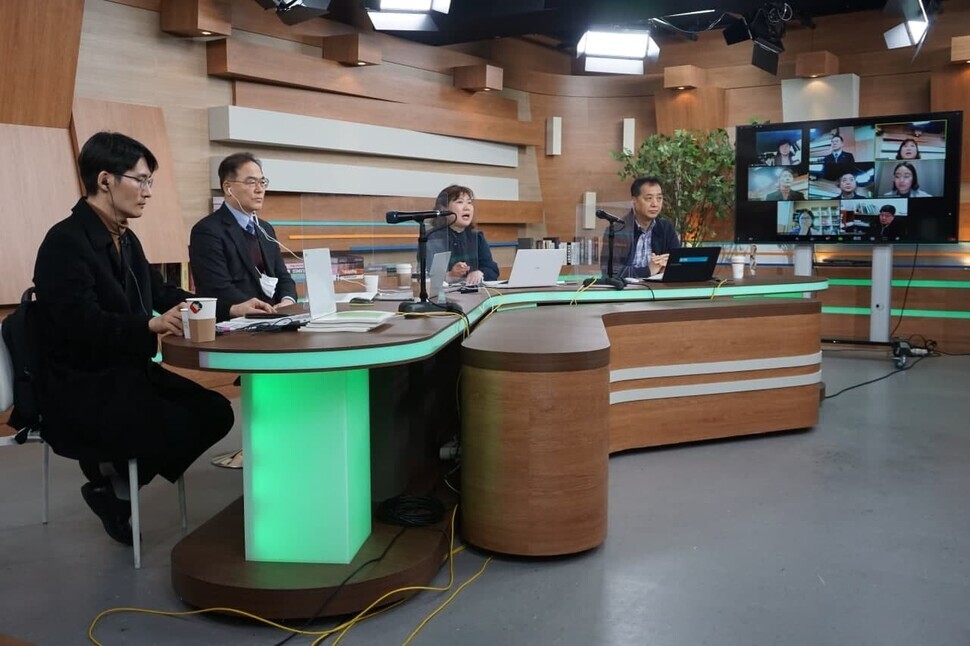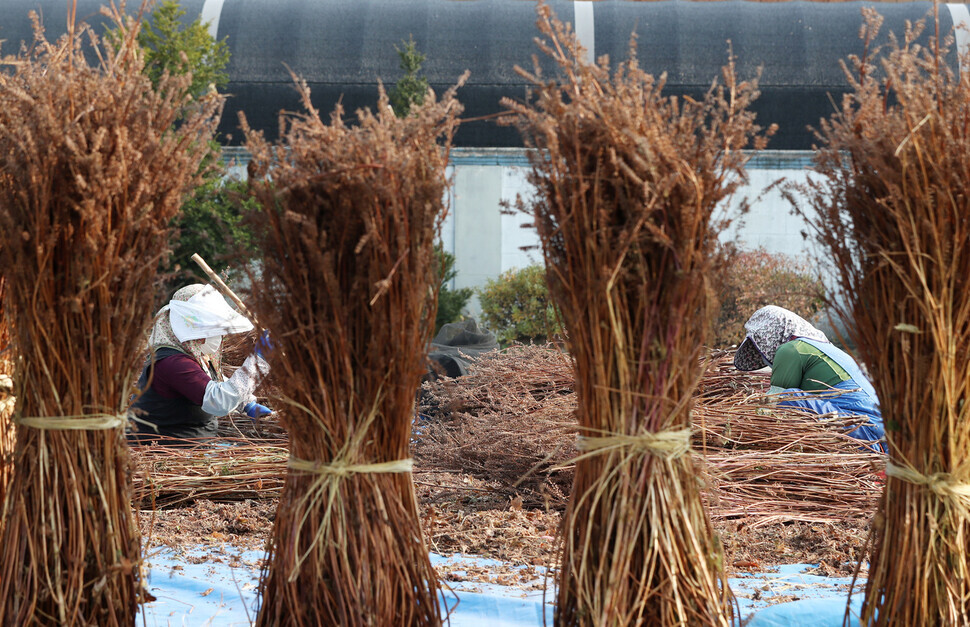hankyoreh
Links to other country sites 다른 나라 사이트 링크
Battling depopulation and climate crisis, farmers seek stable income

Rural areas have been neglected in the Korean government's development strategy and gradually fallen behind urban areas amid liberalization of the agricultural market. What remedies might be available for those areas? What impact will the climate crisis have there? And what role could basic income play in this?
The 2nd Rural Basic Income Policy Forum, which was held at the office of the Hankyoreh on March 3, examined how rural areas will be impacted by the rural basic income that Gyeonggi Province plans to distribute in the second half of this year. The forum was organized by the Hankyoreh Economy and Society Research Institute, the Gyeonggi Agrofood Institute, the Basic Income Korean Network, LAB2050 (a private-sector policy institute), the Institute of Governmental Studies at Korea University, the Korea Regional Development Foundation, the National Assembly's Basic Income Research Forum, and the Gyeonggi Provincial Assembly's Basic Income Research Forum.
Rural areas have come under the spotlight not only for the numerous structural problems they face but also for the new potential they represent.
"Rural residents are the direct victims of the climate crisis," stressed Choi Jae-gwan, president of the Agro-fisheries Policy Forum, in his keynote address at the forum. Choi dealt with practical agricultural policy during a yearlong tenure as agro-fisheries secretary at the Blue House under President Moon Jae-in, beginning in June 2018.

Choi argued that income stability is essential if rural residents are to respond to climate change.
"We can't ask farmers to run their farms in an environmentally friendly manner unless they have a stable income. To bring about an ecological transformation, we need to expand the government's direct payment system, pay farmers basic income, and provide them with financial subsidies for using agricultural techniques that reduce carbon emissions," Choi said.
The second presentation was made by Kim Mi-gyeong, former vice chair of the Korean Women Peasants' Association. Kim emphasized that in Haman County, South Gyeongsang Province, where she grows watermelons, she is still the youngest farmer, just as she was when she moved to the countryside 22 years ago. Kim explains that young people continue to leave rural areas, leaving most of them in danger of depopulation.
"Farmers have to be officially registered with the government in order to receive direct payments and other government subsidies. But since women have trouble getting by on farming alone, a substantial number of them also work at cafeterias or restaurants so they can be enrolled in the four social insurance programs. That prevents them from getting recognized as farmers," Kim said.
The fact that women are excluded from a large number of the government programs established to support farming households came up several times in the forum. Several local governments treat the household as the standard for paying rural subsidies, but the Korean Women Peasants' Association argues that the standard for support should be changed from the "household" to the "individual." The difference between whether government payments are made to the individual or to the householder is also an important criterion for distinguishing between basic income and existing social welfare payments.
Song Won-gyu, deputy director of the Agricultural Farmers' Policy Institute, brought up an issue with the current direct payment system, one of the government programs that support farmers directly. Song explained that the direct payments are determined according to the amount of land owned by the farmers.
"In 2015, the average amount of direct payments was 4.63 times that of the median amount. That means that direct payments are concentrated on a small group of farmers," Song said.
"Households cultivating less than 1 hectare, or 72% of farming households, receive 29% of the direct payments, while households cultivating three or more hectares, or 7% of farming households, receive 38% of those payments."
The forum also featured a debate moderated by Jung Hae-il, professor of public policy at Korea University.
"For rural areas to deal with the double threat they face, namely depopulation and climate change, they need to have a material basis for feeling okay about the possibility of setbacks and failures," said Park Seon-mi, secretary-general of the Basic Income Korean Network and the first participant in the debate.
"Rural revitalization and local regeneration need to be pursued as a strategic response by the state. One way to do that is by paying all subsidies to individual farmers [rather than households]," said Heo Heon-jung, director of the Korea Regional Development Foundation.
"In addition to raising the issues of population aging and depopulation in rural areas, we need to reorient our rural policy on ensuring that [farmers'] customers, which is to say the entire Korean public, have safe food to eat," said Kim Gyeong-ho, vice chair of the Agricultural Administration and Maritime Committee in the Gyeonggi Provincial Assembly.
By Yoon hyeong-joong, visiting fellow at the Hankyoreh Economy and Society Research Institute
Please direct comments or questions to [english@hani.co.kr]

Editorial・opinion
![[Column] Season 2 of special prosecutor probe may be coming to Korea soon [Column] Season 2 of special prosecutor probe may be coming to Korea soon](https://flexible.img.hani.co.kr/flexible/normal/500/300/imgdb/original/2024/0426/3317141030699447.jpg) [Column] Season 2 of special prosecutor probe may be coming to Korea soon
[Column] Season 2 of special prosecutor probe may be coming to Korea soon![[Column] Park Geun-hye déjà vu in Yoon Suk-yeol [Column] Park Geun-hye déjà vu in Yoon Suk-yeol](https://flexible.img.hani.co.kr/flexible/normal/500/300/imgdb/original/2024/0424/651713945113788.jpg) [Column] Park Geun-hye déjà vu in Yoon Suk-yeol
[Column] Park Geun-hye déjà vu in Yoon Suk-yeol- [Editorial] New weight of N. Korea’s nuclear threats makes dialogue all the more urgent
- [Guest essay] The real reason Korea’s new right wants to dub Rhee a founding father
- [Column] ‘Choson’: Is it time we start referring to N. Korea in its own terms?
- [Editorial] Japan’s rewriting of history with Korea has gone too far
- [Column] The president’s questionable capacity for dialogue
- [Column] Are chaebol firms just pizza pies for families to divvy up as they please?
- [Column] Has Korea, too, crossed the Rubicon on China?
- [Correspondent’s column] In Japan’s alliance with US, echoes of its past alliances with UK
Most viewed articles
- 1Is Japan about to snatch control of Line messenger from Korea’s Naver?
- 2[News analysis] Using lure of fame, K-entertainment agency bigwigs sexually prey on young trainees
- 3[Column] Park Geun-hye déjà vu in Yoon Suk-yeol
- 4Will NewJeans end up collateral damage in internal feud at K-pop juggernaut Hybe?
- 5‘We must say no’: Seoul defense chief on Korean, USFK involvement in hypothetical Taiwan crisis
- 6[Column] The clock is ticking for Korea’s first lady
- 7[Column] Season 2 of special prosecutor probe may be coming to Korea soon
- 8Korea’s 1.3% growth in Q1 signals ‘textbook’ return to growth, says government
- 9Division commander ordered troops to enter raging flood waters before Marine died, survivor says
- 10Report reveals toxic pollution at numerous USFK bases